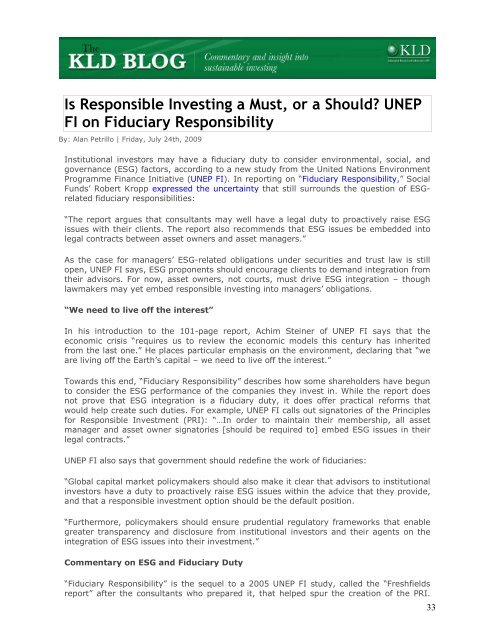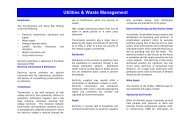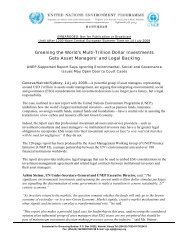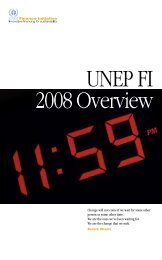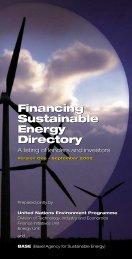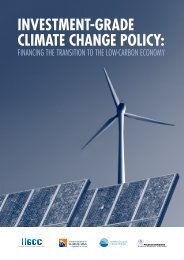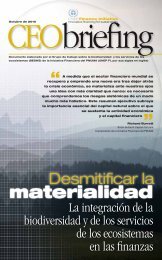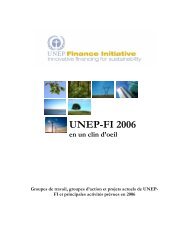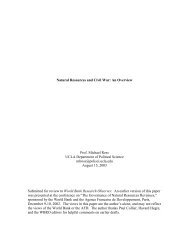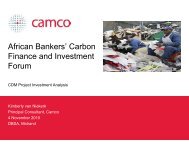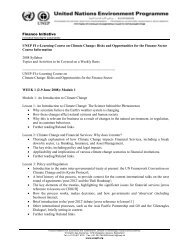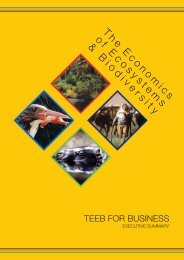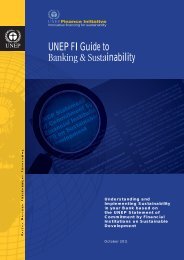UNEP FI Asset Management Working Group The - UNEP Finance ...
UNEP FI Asset Management Working Group The - UNEP Finance ...
UNEP FI Asset Management Working Group The - UNEP Finance ...
Create successful ePaper yourself
Turn your PDF publications into a flip-book with our unique Google optimized e-Paper software.
Is Responsible Investing a Must, or a Should? <strong>UNEP</strong><br />
<strong>FI</strong> on Fiduciary Responsibility<br />
By: Alan Petrillo | Friday, July 24th, 2009<br />
Institutional investors may have a fiduciary duty to consider environmental, social, and<br />
governance (ESG) factors, according to a new study from the United Nations Environment<br />
Programme <strong>Finance</strong> Initiative (<strong>UNEP</strong> <strong>FI</strong>). In reporting on “Fiduciary Responsibility,” Social<br />
Funds’ Robert Kropp expressed the uncertainty that still surrounds the question of ESGrelated<br />
fiduciary responsibilities:<br />
“<strong>The</strong> report argues that consultants may well have a legal duty to proactively raise ESG<br />
issues with their clients. <strong>The</strong> report also recommends that ESG issues be embedded into<br />
legal contracts between asset owners and asset managers.”<br />
As the case for managers’ ESG-related obligations under securities and trust law is still<br />
open, <strong>UNEP</strong> <strong>FI</strong> says, ESG proponents should encourage clients to demand integration from<br />
their advisors. For now, asset owners, not courts, must drive ESG integration – though<br />
lawmakers may yet embed responsible investing into managers’ obligations.<br />
“We need to live off the interest”<br />
In his introduction to the 101-page report, Achim Steiner of <strong>UNEP</strong> <strong>FI</strong> says that the<br />
economic crisis “requires us to review the economic models this century has inherited<br />
from the last one.” He places particular emphasis on the environment, declaring that “we<br />
are living off the Earth’s capital – we need to live off the interest.”<br />
Towards this end, “Fiduciary Responsibility” describes how some shareholders have begun<br />
to consider the ESG performance of the companies they invest in. While the report does<br />
not prove that ESG integration is a fiduciary duty, it does offer practical reforms that<br />
would help create such duties. For example, <strong>UNEP</strong> <strong>FI</strong> calls out signatories of the Principles<br />
for Responsible Investment (PRI): “…In order to maintain their membership, all asset<br />
manager and asset owner signatories [should be required to] embed ESG issues in their<br />
legal contracts.”<br />
<strong>UNEP</strong> <strong>FI</strong> also says that government should redefine the work of fiduciaries:<br />
“Global capital market policymakers should also make it clear that advisors to institutional<br />
investors have a duty to proactively raise ESG issues within the advice that they provide,<br />
and that a responsible investment option should be the default position.<br />
“Furthermore, policymakers should ensure prudential regulatory frameworks that enable<br />
greater transparency and disclosure from institutional investors and their agents on the<br />
integration of ESG issues into their investment.”<br />
Commentary on ESG and Fiduciary Duty<br />
“Fiduciary Responsibility” is the sequel to a 2005 <strong>UNEP</strong> <strong>FI</strong> study, called the “Freshfields<br />
report” after the consultants who prepared it, that helped spur the creation of the PRI.<br />
33


